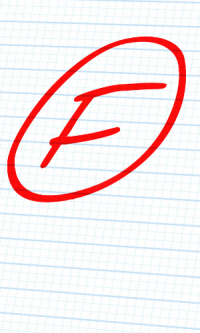In a world where education is driven by performance goals the action of failing to achieve a target has resulted in labels being given to children at an early age.
The action of failing at something has become an identity. I failed, therefore, I am a failure.
Failing to get a certain level in a test identifies children as being below target to the teacher — surely this is a good thing? Teachers can set work that is appropriate to that child’s needs, that is pitched correctly and enables that child to move forward. Personalised learning — the goal of so many educational establishments.
This is the ACT of failing, there is nothing wrong with this, it provides lessons that can form the basis of the next attempt. The danger is that when the results of these tests are made public for all to see, children recognise that they haven’t achieved the required level, they have now been labelled and given an IDENTITY— They are failures.
With a fixed mindset, the loss of your previous identity to failure can have long-term damaging consequences. Failure diminishes you, makes you less than you were. Failure means you lack competence or potential. If you are a failure where do you go from here?
In many cases, the response is simply to give up. “I am no good at this, so why should I bother?” In children who are already vulnerable, repeated messages of failure enhance their own self-image, until it becomes a self-fulfilling prophecy. “I’m no good at this, so I won’t bother putting the effort in.” The result — another failure — “See, I told you I was no good at this.”
If you have a fixed mindset you always risk being defined by your failures, because they measure you in some way. No matter how smart, talented or able you may be having a fixed mindset strips away your resilience, your ability to cope with failure.
Does this mean we should protect children and others from their failures? HELL NO! Just because they may be vulnerable and discouraged, just because it may upset them? Sure this will protect their feelings in the short term, but it does nothing to help them in the long-term. In fact, it will probably damage them.
We all need honest and constructive feedback. If we have failed, we need to know how we can improve, what actions we need to take. Don’t pass the blame onto others.
John McEnroe is famous for blaming anything but himself throughout his Super Brat career. Umpiring decisions, the condition of the court, his equipment — even the sawdust that he used to dry his hands. He hated losing, it made him less special, and he would often fold, which in his own words meant he “didn’t live up to his potential.”
We need to build in grit and determination to children from an early age. “You failed this time, what happens if you try again, but do it differently?” But this means that we need to model how to cope with failure. Stop holding people up as geniuses who are always successful, instead, we should show the people who were successful despite their failures, perhaps we would learn more from them, perhaps then we would aspire to be like them. Many successful people have failed far more than those who are unsuccessful because the act of failing doesn’t define them.
If you don’t believe me — look at this list:
- James Dyson — Over 5,000 failed prototypes before the Dyson Vacuum Cleaner was created.
- Einstein — They all thought he was mentally handicapped because he didn’t read until he was 7, and only started speaking at 4!
- Dr Seuss — Had his first book rejected by 27 different publishers
- Elvis — Was fired after his first performance at the Grand Ole Opry and told to go back to truck driving.
- Fred Astaire — Can’t sing. Can’t act. Slightly balding. Can dance a little. The comments made after his first screen test.
The act of failing is simply realising that there is a lesson for you to learn — there should be no blame because then you don’t take responsibility for your own development.
Do your failures identify you or drive you forward?

